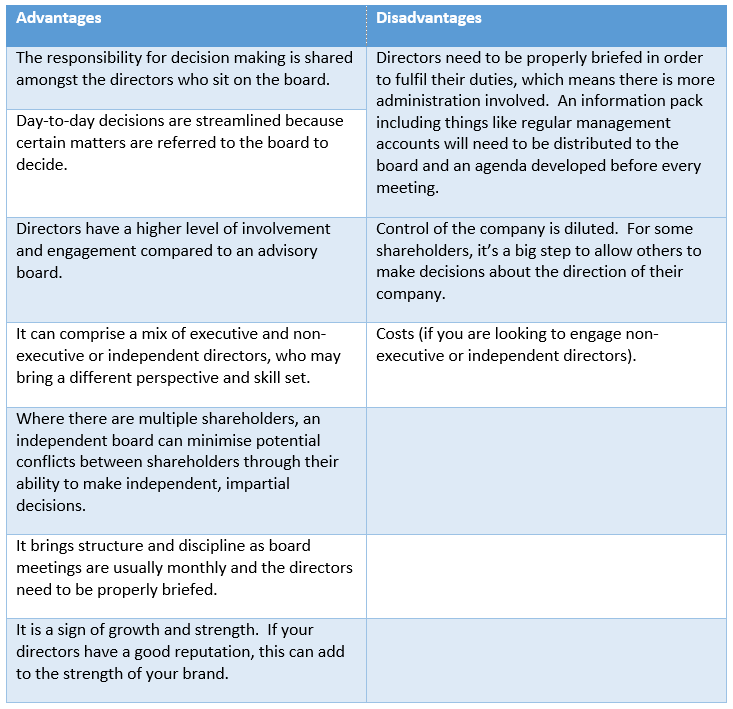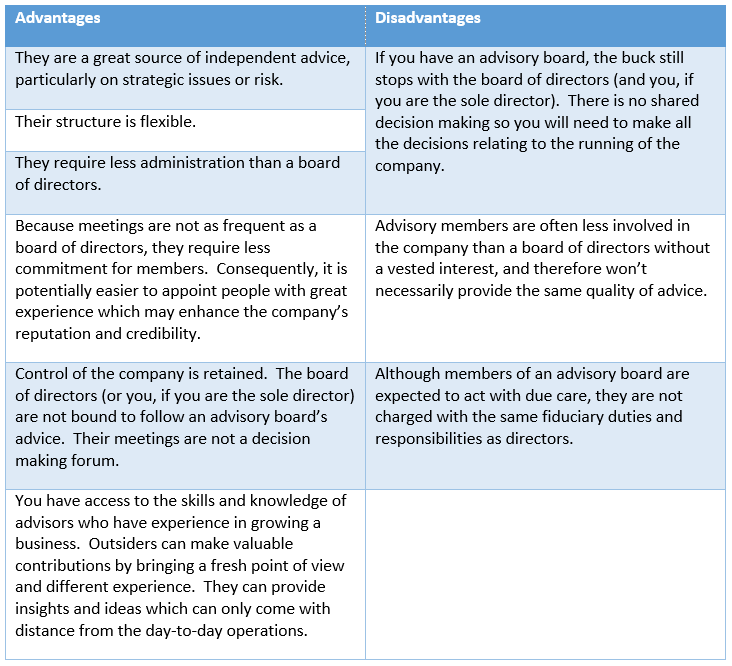Every company has a board of directors, even if it is just one or two people. As companies grow, their founders tend to seek the help of others in making important decisions. One way this occurs is through the appointment of more directors, potentially including independent or non-executive directors, to create a more formal board. Another is through the creation of an advisory board.
What is an advisory board?
An advisory board is an informal group of advisors that is separate to a company’s board of directors. As the name suggests, an advisory board provides advice to the company, rather than making decisions for it. Its key function is to act as a sounding board for the company and to provide non-binding strategic advice on how to manage, grow or transition the company.
Unlike a board of directors, an advisory board is appointed by the company, not its shareholders. Advisory boards are usually limited to external advisors who have particular experience in the company’s industry. Typically, an advisory board would include two or three independent members, and often include lawyers, accountants, marketing experts, financial advisers or industry experts.
Meeting regularly or semi-regularly, typically between six to eight times per year, means an advisory board is a more flexible format than a board of directors. Additionally, an advisory board is not regulated by the Corporations Act or any corporate governance codes.
What is a board of directors?
The role of a board of directors is to manage the company’s business, which includes making decisions relating to the day-to-day running of the company.
The Corporations Act imposes obligations and liabilities on directors, including the responsibility to act in good faith in the best interests of the company and for a proper purpose. This means directors can be sued personally for their acts and omissions as directors. (You can read more about how to limit your personal exposure as a director here.) Consequently, a board of directors tends to be a relatively formal, focused environment.
What are the advantages & disadvantages of a board of directors?

What are the advantages & disadvantages of having an advisory board?

Is an advisory board a good idea?
It really depends what you are looking for.
A board of directors (with one or more independent directors) may be the right decision for you if you:
- want to adopt a more corporate structure;
- would like to add some weight to your top level of management;
- are willing to allow others to make important decisions; and
- are ready for an extra level of administration.
If you’re simply after a sounding board, and would prefer to retain decision-making powers internally, an advisory board may be the better option. Similarly, if you are looking to support an existing board of directors, an advisory board may be of great benefit to you as it will bring specialist skills, experience, knowledge or business networks for the board to consider.
How to set up a board of directors or advisory board
There is some administration and cost involved in setting up a board, whether that’s a board of directors or advisors. You should view the time and cost as an investment.
To establish a board of directors, you will need:
- formal resolutions (usually by shareholders) to appoint the directors to the board;
- consents from each of the directors to act as a director of the company; and
- to notify ASIC of the appointments.
Independent directors will typically also require Deeds of Indemnity and Access and directors and offices insurance.
In contrast, there are no mandatory formalities to establish an advisory board (e.g. resolutions or ASIC notice requirements). But you should have some paperwork to limit the potential liability of advisory board members.
Specifically, where an advisory board is appointed, you will need to be careful to ensure members of the advisory board are not deemed to be de facto or shadow directors. Ideally, you should have a charter or terms of reference that set out the advisory board’s remit, constitution, function, accountability and responsibility. By defining the role of the advisory board and its members at the outset, and then ensuring the advisory board doesn’t stray outside those parameters, you minimise the risk that the members will be deemed directors and thereby assume all of the risks that this entails. Keep in mind that calling a board an “advisory board” doesn’t necessarily prevent its members from being bound by legal duties if it is essentially making all the decisions of the company.






